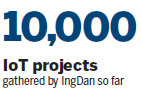CEO Kang believes global perspective crucial in business
Jeffrey Kang firmly believes it is crucial for Chinese businesses to have a global perspective, as China is urged to have true "global corporations".
That is how the 46-year-old Shenzhen entrepreneur has been developing his company IngDan, having extended its footprint from the Chinese mainland to Hong Kong, Israel, Silicon Valley and Italy, while focusing on becoming part of a "sharing economy".
IngDan, which was founded in 2013, is an Internet of Things online platform that links smart hardware entrepreneurs with supply chain resources in China, mainly in Shenzhen and surrounding cities.
It has, so far, gathered over 10,000 IoT projects and 6,000 suppliers and accumulated 8 million followers.
With the vision of "hatching smart hardware devices and products on IoT", Kang hopes that China's rich manufacturing resources can be shared by entrepreneurs from all over the world.
"In the past, only those multinational companies like Google, Cisco and Apple could use those rich manufacturing resources. My dream is to open up those resources," Kang said.
"This means younger innovators and entrepreneurs across the world can use the Internet to access those rich resources to help them lower their cost of making mistakes."
Increasingly more Chinese enterprises are expanding abroad in recent years, having made mergers and acquisitions overseas.
According to official statistics, there were 593 overseas M&A projects from Chinese enterprises last year, with the total value amounting to $40.1 billion.
Of those, $33.8 billion worth, or roughly 84.3 percent, were overseas direct investments.
However, that doesn't necessarily mean they have become global corporations, said Professor Wang Zhile of the Chinese Academy of International Trade& Economic Cooperation, under the Ministry of Commerce.
Global corporations, he said, feature a higher degree of globalization than transnational corporations, and that can be evaluated by the Transnationality Index, which is formed based on the ratio of their overseas assets, sales and staff.
The index for the top 100 Chinese transnational corporations was 13.6 percent in 2014, according to the China Enterprise Confederation, much lower than the average level of the world's top 100 players, 64.55 percent.
Global corporations absorb and allocate resources globally and create global value chains, Wang said.
"For Chinese enterprises going global, they need to develop a global mindset and move from integrating domestic resources to creating global value chains," he said.
"IngDan, in this aspect, offers a platform. This is a wonderful innovation. The more the number of such kind of companies, the stronger the capability of Chinese enterprise in creating global value chains will become."
Kang said the meaning of IngDan going global lies also in the building of a "sharing economy", a hybrid market model that refers to the peer-to-peer-based sharing of access to goods and services, coordinated through online services.
sally@chinadailyhk.com

(China Daily 03/22/2016 page15)














